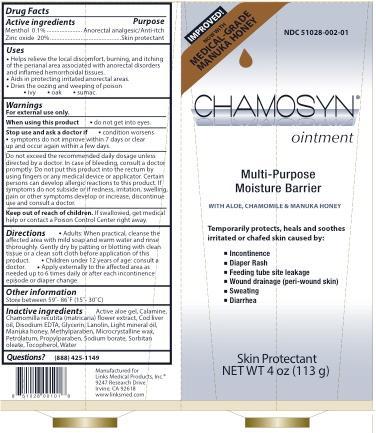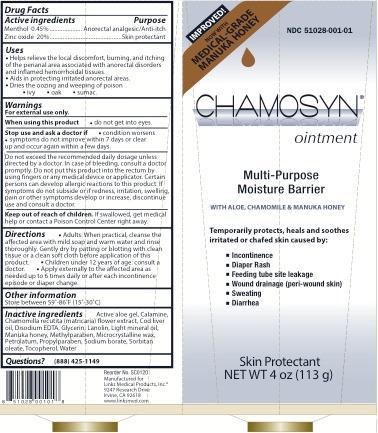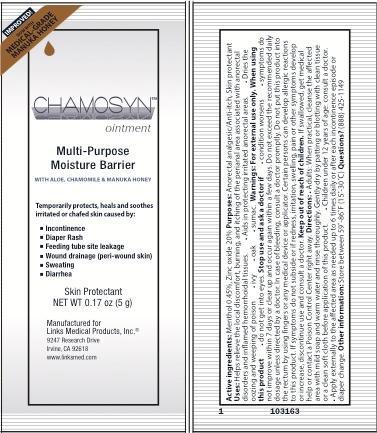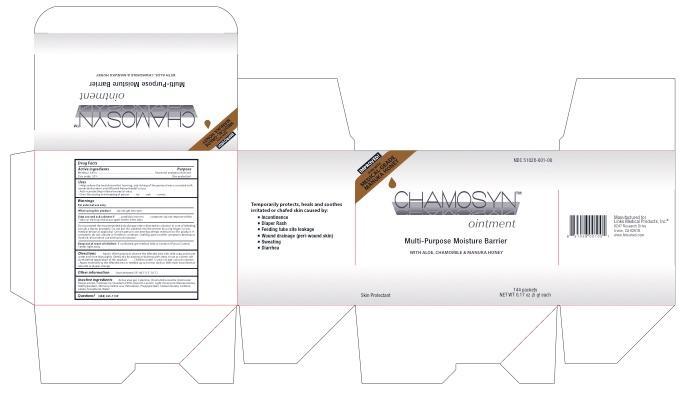Chamosyn Paraben Free | Barrier Cream Ointment while Breastfeeding

What is Chamosyn Paraben Free | Barrier Cream Ointment used for?
Brief: Anorectal analgesic/Anti-itch Skin protectant
I am currently breastfeeding and I want to know if using Chamosyn Paraben Free | Barrier Cream Ointment is safe for my kid? Does it have any effect on milk production?

Chamosyn Paraben Free | Barrier Cream Ointment Breastfeeding Analsys
Menthol while Breastfeeding
SafeHerb which is widely used by many cultures. It has been used even for pain relief during pregnancy and colicky pain in fussy babies (without proved data on this). Since it is non toxic at appropriate dose and a tiny excretion into breast milk of active metabolite Menthol, a moderate consumption is believed compatible while breastfeeding. Dessicated leaves and essential oil of the plant that contains Menthol are used. Properties that have been demonstrated and approved indications are: as spasmolytic for Dyspepsia, Irritable Colon and flatulence. It has been used for the treatment of cracked nipple with best results than placebo or Lanolin. Although with no proven effectiveness, it is traditionally used for cough relief, common cold, pain or itching by local application or inhalation. Overdosing of essential oil may be harmful. Do not expose infants to inhalation of products that contain Menthol (irritation of the air way) In case of use on the nipple, do it after feeding the baby and cleanse thoroughly the surface before the next one.
Zinc oxide while Breastfeeding
SafeCAS Number: 1314-13-2

It is used topically as an astringent and skin protector, very often together with small amounts of Ferric Oxide to form Calamine (see specific info). It is a product compatible with breastfeeding according to WHO Essential Medicine’s List - 2002.It is also used in dental hygiene products and cosmetics. Widely used for skin protection of the diaper area in infants. Because of the small dose used and poor absorption into plasma of most topical dermatological preparations, excretion into breastmilk in significant amount appears to be unlikely. Do not apply on the breast to prevent infant ingestion; otherwise, wash it off thoroughly with water before the next breast feed.
Chamosyn Paraben Free | Barrier Cream Ointment Breastfeeding Analsys - 2
Menthol while Breastfeeding

Peppermint (Mentha x piperita) contains menthol, menthone, menthyl acetate as major ingredients. Minor ingredients include 1,8-cineole, pulegone, bitter substances, caffeic acid, flavonoids, and tannins. Peppermint is a purported galactogogue; however, no scientifically valid clinical trials support this use.[1] Galactogogues should never replace evaluation and counseling on modifiable factors that affect milk production.[2] Topical peppermint gel and solutions have been studied for the prevention of pain and cracked nipples and areolas in nursing women. The peppermint preparations were more effective than placebo and expressed breastmilk, and about as effective as lanolin,[3][4][5][6] although a meta-analysis concluded that application of nothing or breastmilk may be superior to lanolin, but good studies are lacking.[7] Menthol is excreted into breastmilk in small quantities; the excretion of other components have not been studied. Peppermint is "generally recognized as safe" (GRAS) as a food by the U.S. Food and Drug Administration. Large doses can cause heartburn, nausea and vomiting. Allergic reactions, including headache, have been reported to menthol. If peppermint is used on the nipples, it should be used after nursing and wiped off before the next nursing. Dietary supplements do not require extensive pre-marketing approval from the U.S. Food and Drug Administration. Manufacturers are responsible to ensure the safety, but do not need to the safety and effectiveness of dietary supplements before they are marketed. Dietary supplements may contain multiple ingredients, and differences are often found between labeled and actual ingredients or their amounts. A manufacturer may contract with an independent organization to verify the quality of a product or its ingredients, but that does certify the safety or effectiveness of a product. Because of the above issues, clinical testing results on one product may not be applicable to other products. More detailed information #about dietary supplements# is available elsewhere on the LactMed Web site.

What should I do if already breastfed my kid after using Chamosyn Paraben Free | Barrier Cream Ointment?
It is always a good idea to keep your healthcare provider or doctor informed about your drug usage during pregnancy and breastfeeding but if you have not informed your doctor about Chamosyn Paraben Free | Barrier Cream Ointment and have used it then do not panic as Chamosyn Paraben Free | Barrier Cream Ointment is mostly safe in breastfeeding and should not cause any harm to your baby.
My health care provider has asked me to use Chamosyn Paraben Free | Barrier Cream Ointment, what to do?
Definitely, Chamosyn Paraben Free | Barrier Cream Ointment is safe in lactation for baby. No wonder your doctor has recommended it.
If I am using Chamosyn Paraben Free | Barrier Cream Ointment, will my baby need extra monitoring?
No extra baby monitoring required while mother is using Chamosyn Paraben Free | Barrier Cream Ointment
Who can I talk to if I have questions about usage of Chamosyn Paraben Free | Barrier Cream Ointment in breastfeeding?
US
National Womens Health and Breastfeeding Helpline: 800-994-9662 (TDD 888-220-5446) 9 a.m. and 6 p.m. ET, Monday through Friday
UK
National Breastfeeding Helpline: 0300-100-0212 9.30am to 9.30pm, daily
Association of Breastfeeding Mothers: 0300-330-5453
La Leche League: 0345-120-2918
The Breastfeeding Network supporter line in Bengali and Sylheti: 0300-456-2421
National Childbirth Trust (NCT): 0300-330-0700
Australia
National Breastfeeding Helpline: 1800-686-268 24 hours a day, 7 days a week
Canada
Telehealth Ontario for breastfeeding: 1-866-797-0000 24 hours a day, 7 days a week
